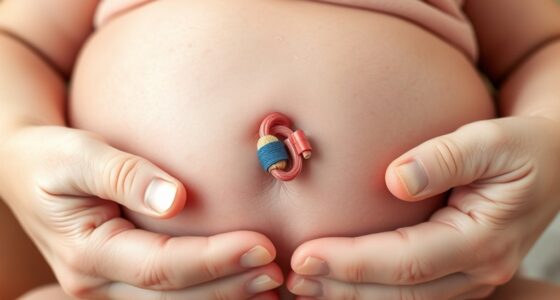If your newborn has a fever of 100.4°F (38°C) or higher, act immediately, as it signals possible serious illness. Look for signs like difficulty breathing, lethargy, poor feeding, or irritability, which require urgent care. Be attentive to your baby’s behavior and overall condition, and don’t wait if they show any concerning symptoms. Knowing these warning signs can help you decide when to seek emergency help and guarantee your baby gets prompt treatment.
Key Takeaways
- A rectal temperature of 100.4°F (38°C) or higher indicates a fever requiring urgent evaluation.
- Signs like lethargy, difficulty feeding, or persistent irritability alongside fever signal serious concern.
- Breathing difficulty, bluish skin, or seizures in a febrile newborn are urgent signs needing immediate medical attention.
- Fever accompanied by vomiting, diarrhea, or signs of dehydration warrants urgent care.
- Any fever in a newborn under one month old should prompt immediate medical contact, regardless of other symptoms.

Have you ever wondered why a fever in a newborn requires immediate attention? It’s because young babies have immature immune systems, making them more vulnerable to infections that can escalate quickly. When you notice your newborn’s temperature is higher than normal, it’s natural to feel worried. While some parents might consider home remedies, it’s essential to remember that accurate temperature measurement is the first step. Using a reliable digital thermometer, gently check your baby’s temperature rectally, as this provides the most precise reading for infants. Avoid using oral or forehead thermometers on a newborn, since these methods aren’t as accurate at this age.
Once you’ve measured the temperature, consider what the number indicates. A rectal temperature of 100.4°F (38°C) or higher generally signals a fever in a newborn. But don’t rely solely on the number—observe your baby’s overall behavior. Is your baby unusually irritable, lethargic, or refusing to feed? Are they crying more than usual or showing signs of discomfort? These symptoms, combined with a high temperature, point to a need for immediate medical evaluation.
A rectal temperature of 100.4°F (38°C) or higher in a newborn signals a fever needing immediate medical attention.
Although some parents might think about home remedies to reduce fever, it’s essential to understand that they are not substitutes for professional care in newborns. Using cool cloths on the forehead or giving sponge baths with lukewarm water can help comfort your baby, but they shouldn’t replace seeking urgent medical advice. Never use cold water, alcohol rubs, or attempt to lower the fever aggressively without consulting a healthcare provider. Remember, a newborn’s body temperature regulation isn’t as effective as in older children or adults, so quick and appropriate medical intervention is essential. Recognizing signs of serious infection**** early can be lifesaving.
Being vigilant about temperature measurement and watching for other signs of illness can make a significant difference. Keep your thermometer handy and check your baby’s temperature if they seem fussier, less active, or if their skin feels unusually warm. Even if the fever appears mild, it’s better to err on the side of caution and get your baby evaluated promptly. In some cases, a fever might be a symptom of a serious infection, such as sepsis, which requires urgent treatment. Trust your instincts—if your newborn shows any signs of distress or if you’re unsure about their condition, don’t hesitate to contact your healthcare provider immediately. Early intervention can prevent complications and ensure your baby gets the care they need.
Frequently Asked Questions
When Should Parents Administer Medication for a Newborn’s Fever?
You should give your newborn fever reducers like acetaminophen only if advised by a healthcare professional, especially when the fever is high or causing discomfort. Avoid home remedies that aren’t approved by your doctor. If the fever persists or worsens, or if your baby shows signs of distress, seek urgent medical care. Never give medication without proper guidance to guarantee safety for your newborn.
Can a Fever in a Newborn Be Caused by Teething?
You might think teething causes a fever, but fever myths often lead to misconceptions. While teething discomfort can make your baby irritable or drool more, it usually doesn’t cause a significant fever. If your newborn has a high or persistent fever, it’s essential to seek medical attention promptly. Don’t rely solely on teething as an explanation—monitor their symptoms carefully and consult your healthcare provider for proper guidance.
How Can I Differentiate Between a Mild and Serious Fever?
To tell if a fever is mild or serious, you need to monitor your baby’s temperature accurately and assess their symptoms carefully. A mild fever usually stays below 100.4°F (38°C) and is accompanied by minor discomfort. A serious fever often exceeds this temperature, and your baby may show signs like lethargy, difficulty breathing, or unresponsiveness. Always trust your instincts and seek medical care if you’re unsure or if symptoms worsen.
Are There Specific Viruses or Bacteria Linked to Newborn Fevers?
Did you know that viral infections cause about 60% of newborn fevers? Yes, viruses like herpes simplex and enteroviruses are common culprits, along with bacterial pathogens such as Group B Streptococcus and E. coli. These infections can be serious, so if your newborn has a fever, it’s vital to seek medical care promptly. Recognizing these causes helps make certain quick treatment and reduces risk to your baby’s health.
What Are the Long-Term Effects of a Fever in a Newborn?
Fever in a newborn can have long-term effects, especially if linked to infections, potentially causing long-term neurological impacts like developmental milestone delays. If the fever is due to a serious illness, it might affect brain development or cause learning difficulties later. You should consult a healthcare provider promptly to evaluate the cause and prevent possible long-term complications, ensuring your baby gets the necessary treatment and monitoring.
Conclusion
If your newborn develops a fever, don’t wait—seek medical care immediately. Imagine holding your tiny baby, who suddenly feels warm and irritable; that’s a sign to act fast. Early intervention can be lifesaving, preventing serious infections. Always trust your instincts and remember, when it comes to fever in newborns, urgent signs are not to be ignored. Your quick response could make all the difference for their health and future.









